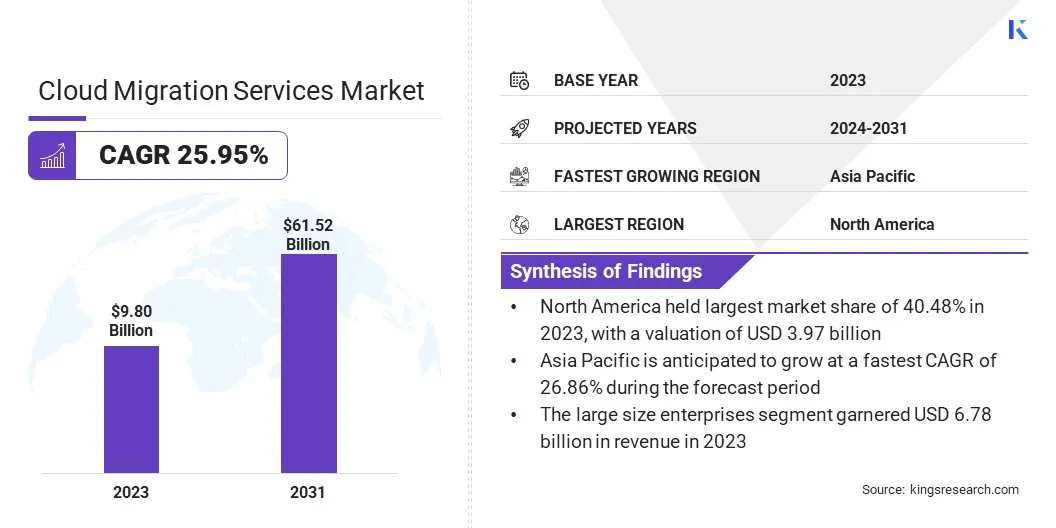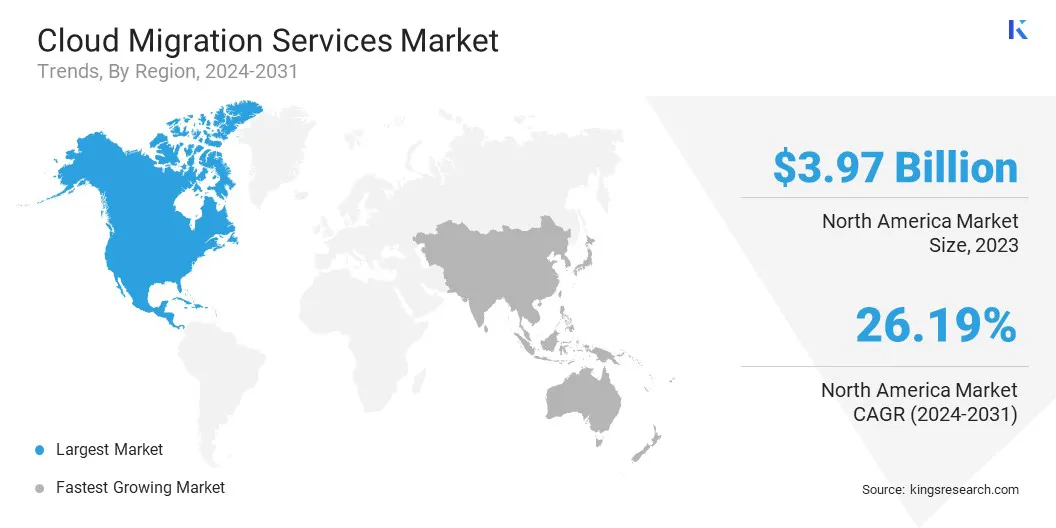Market Definition
The market comprises solutions that enable businesses to move digital assets, applications, and workloads from on-premises infrastructure to cloud-based environments. It includes strategies such as rehosting, re-platforming, refactoring, and hybrid cloud integration. The report highlights key drivers influencing the market , along with emerging trends and evolving regulatory frameworks shaping the industry.
Cloud Migration Services Market Overview
The global cloud migration services market size was valued at USD 9.80 billion in 2023 and is projected to grow from USD 12.24 billion in 2024 to USD 61.52 billion by 2031, exhibiting a CAGR of 25.95% during the forecast period.
Market expansion is fueled by the rising enterprise adoption of cloud computing, the demand for scalable, cost-effective IT infrastructure, and increased emphasis on security and compliance. Businesses across various industries are shifting from legacy on-premises systems to cloud environments to improve operational efficiency, agility, and digital transformation.
Major companies operating in the cloud migration services industry are Amazon Web Services, Inc., Microsoft, Google LLC, IBM, Deloitte.com, Wipro, Accenture, Infosys Limited, Oracle, DXC Technology Company, Capgemini, SAP SE, Broadcom, NTT DATA, Inc., and Cisco Systems, Inc.
Market expansion is further fueled by advancements in artificial intelligence (AI), machine learning (ML), and automation, which streamline migration processes and reduce complexities. The growing adoption of hybrid and multi-cloud strategies is expected to create significant opportunities for cloud migration service providers, supporting continued market expansion.
- In August 2024, Alight, Inc. announced the successful completion of its cloud migration, improving system performance, scalability, and security while reducing costs. The migration enhances operational efficiency, enabling Alight to better support its clients through a more agile and resilient digital infrastructure.

Key Highlights:
- The cloud migration services industry size was recorded at USD 9.80 billion in 2023.
- The market is projected to grow at a CAGR of 25.95% from 2024 to 2031.
- North America held a share of 40.48% in 2023, valued at USD 3.97 billion.
- The solution segment garnered USD 6.27 billion in revenue in 2023.
- The public segment is expected to reach USD 31.29 billion by 2031.
- The SMEs segment is anticipated to witness the fastest CAGR of 26.70% over the forecast period
- The IT & telecommunications segment garnered USD 2.41 billion in revenue in 2023.
- Asia Pacific is anticipated to grow at a staggering CAGR of 26.86% through the projection period.
Market Driver
Rising Adoption of Cloud Computing
The rising adoption of cloud computing is bolstering the growth of the market, as businesses shift from on-premises infrastructure to cloud-based environments. Organizations are leveraging cloud solutions to enhance operational efficiency, scalability, and cost-effectiveness.
Cloud computing provides flexible, on-demand access to resources, enabling innovation and business agility. It supports remote work, strengthens collaboration, and optimizes data management. As digital transformation accelerates, the demand for secure and seamless cloud migration services continues to grow, fueling market expansion.
- In March 2024, Interseguro partnered with Kyndryl Inc. to modernize its operations by migrating critical business applications from on-premises infrastructure to Google Cloud Platform (GCP). The collaboration leverages Kyndryl’s expertise to enhance operational efficiency, scalability, and support digital transformation.
Market Challenge
Complexity of Migrating Legacy Systems to the Cloud
Migrating legacy systems to the cloud presents a major challenge to the growth of the cloud migration services market due to outdated architectures, compatibility issues, and the need for significant reconfiguration.
Traditional applications require modifications or custom integrations, increasing migration complexity. Without proper planning and expertise, businesses risk operational inefficiencies, data loss, and extended transition periods, making legacy system migration a critical barrier to cloud adoption.
This challenge can be addressed through a thorough infrastructure assessment, selectiopn of an approprate migration strategy (rehosting, refactoring, or re-platforming), and the use of automation tools.
A phased approach minimizes downtime, while collaboration with cloud experts ensures seamless integration. Robust security and compliance frameworks help mitigate risks and support an efficient cloud transition.
Market Trend
Adoption of Serverless Computing and Containerization
The adoption of serverless computing and containerization is influencing the market by enhancing scalability, efficiency, and cost-effectiveness. Serverless architectures eliminate the need for infrastructure management, allowing businesses to run applications on-demand and scale automatically based on usage.
Containerization enables seamless application deployment across diverse cloud environments by packaging applications with their dependencies. Technologies such as Kubernetes efficiently manage containerized workloads, ensuring flexibility and faster migration.
- For instance, in November 2024, CAST AI, a leading Kubernetes automation platform, introduced its Commercially Supported Container Live Migration feature. This facilitates seamless migration of stateful and critical Kubernetes workloads, including databases and AI/ML applications, ensuring uninterrupted operations, enhanced efficiency, and reduced infrastructure costs.
Cloud Migration Services Market Report Snapshot
|
Segmentation
|
Details
|
|
By Offering
|
Solution (Infrastructure Migration, Platform Migration, Database Migration, Application Migration, Storage Migration), Service (Professional Services, Managed Services)
|
|
By Deployment
|
Public, Private, Hybrid
|
|
By Enterprise Size
|
Large Size Enterprises, SMEs
|
|
By End Use Industry
|
IT & Telecommunications, BFSI, Healthcare, Government & Public Sector, Manufacturing, Automotive, Retail & Consumer Goods, Media & Entertainment, Others
|
|
By Region
|
North America: U.S., Canada, Mexico
|
|
Europe: France, UK, Spain, Germany, Italy, Russia, Rest of Europe
|
|
Asia-Pacific: China, Japan, India, Australia, ASEAN, South Korea, Rest of Asia-Pacific
|
|
Middle East & Africa: Turkey, UAE, Saudi Arabia, South Africa, Rest of Middle East & Africa
|
|
South America: Brazil, Argentina, Rest of South America
|
Market Segmentation
- By Offering (Solution (Infrastructure Migration, Platform Migration, Database Migration, Application Migration, Storage Migration), and Service (Professional Services, Managed Services)): The solution segment earned USD 6.27 billion in 2023 due to rising demand for cloud migration solutions, supported by digital transformation.
- By Deployment (Public, Private, and Hybrid): The public segment held a share of 49.71% in 2023, attributed to cost efficiency, scalability, and widespread enterprise adoption of public cloud services.
- By Enterprise Size (Large Size Enterprises, and SMEs): The large size enterprises segment is projected to reach USD 41.62 billion by 2031, propelled by increased cloud adoption for scalability, cost optimization, and enhanced security.
- By End Use Industry (IT & Telecommunications, BFSI, Healthcare, Government & Public Sector, Manufacturing, Automotive, Retail & Consumer Goods, Media & Entertainment, and Others): The healthcare segment is anticipated to grow at a robust CAGR of 27.75% through the forecast period, largely attributed to increasing cloud adoption for data security, electronic health records (EHRs), telemedicine, and regulatory compliance.
Cloud Migration Services Market Regional Analysis
Based on region, the global market has been classified into North America, Europe, Asia Pacific, Middle East & Africa, and Latin America.

North America cloud migration services market share stood at around 40.48% in 2023, valued at USD 3.97 billion. This dominance is reinforced by the strong presence of leading cloud service providers, rapid technological advancements, and high enterprise adoption for digital transformation.
The growing demand for hybrid and multi-cloud solutions, along with increasing investments in AI and automation, further support regional market growth. Additionally, stringent data security regulations and compliance requirements promote the adoption of secure, scalable cloud migration services.
- In December 2024, Atlassian Corporation and Amazon Web Services (AWS), a subsidiary of Amazon.com, Inc., entered a multi-year Strategic Collaboration Agreement (SCA) to accelerate cloud transformation and enhance AI and security solutions for enterprises. This partnership aims to transition millions of enterprise users from Atlassian’s USD 1 billion Data Center business to Atlassian Cloud over time.
The Asia-Pacific cloud migration services industry is estimated to grow at a robust CAGR of 26.86% over the forecast period. This growth is fostered by increasing digital transformation initiatives, growing cloud adoption among enterprises, and strong government support for cloud infrastructure development.
Emerging economies such as China, India, and Japan are witnessing a surge in demand for scalable and cost-efficient cloud solutions, particularly among SMEs and large enterprises. Additionally, the rise of e-commerce, fintech, and smart city projects is further boosting cloud migration, stimulating regional market expansion.
- In December 2023, Air India announced the successful migration of its entire IT infrastructure to a cloud-only system, closing its historic data centers in Mumbai and New Delhi.This strategic move positions Air India among the first major global airlines to operate exclusively on the cloud, enhancing technological agility and scalability.
Regulatory Frameworks:
- The General Data Protection Regulation of the European Union (EU) governs the processing, storage, and transfer of personal data, emphasizing security, transparency, and user consent in cloud migration and data management.
- International Organization for Standardization ISO/IEC 27001 outlines requirements for information security management systems (ISMS), focusing on risk management, security controls, and continuous monitoring to ensure data integrity, confidentiality, and availability.
- The National Institute of Standards and Technology (NIST) Cybersecurity Framework (CSF) provides guidelines for managing cybersecurity risks, covering the identification, protection, detection, response, and recovery processes to maintain secure and resilient IT systems.
Competitive Landscape
The cloud migration services industry is characterized by intense competition, with key players focusing on strategic partnerships, mergers, and acquisitions to strengthen their market presence. Leading companies are investing in research and development to enhance automation, security, and AI-driven migration solutions.
Market participants are expanding their service portfolios to cater to diverse industry needs, including healthcare, BFSI, and manufacturing. The rise of customized cloud solutions and increased emphasis on customer-centric approaches further shape competitive landscape.
- In July 2024, Globant partnered with Amazon Web Services (AWS) to help clients leverage RISE with SAP for modernizing on-premise SAP ERP systems and facilitating seamless cloud migration.
List of Key Companies in Cloud Migration Services Market:
- Amazon Web Services, Inc.
- Microsoft
- Google LLC
- IBM
- Deloitte.com
- Wipro
- Accenture
- Infosys Limited
- Oracle
- DXC Technology Company
- Capgemini
- SAP SE
- Broadcom
- NTT DATA, Inc.
- Cisco Systems, Inc.
Recent Developments (M&A/Partnerships/Agreements/New Product Launch)
- In March 2025, Limestone Networks, in partnership with Inertia Labs, launched a cloud migration assistance program to help businesses transition to the cloud seamlessly. The initiative offers expert guidance, automation tools, and security enhancements to optimize performance and minimize migration complexities.
- In February 2025, CloudFuze introduced a migration pathway from Amazon WorkDocs to Microsoft 365, facilitating seamless transitions to OneDrive and SharePoint Online ahead of WorkDocs’ shutdown in April 2025.
- In March 2024, Accenture Federal Services collaborated with Microsoft to introduce the Cloud Modernization and Migration Factory on Azure. This initiative aims to accelerate cloud adoption for federal agencies through automated, scalable, and secure solutions.
- In February 2024, Data Intensity expanded its migration capabilities by partnering with Matilda Cloud to leverage automation and AI for more efficient, cost-effective, and simplified enterprise cloud transitions.
- In June 2023, NTT DATA Group Corporation was recognized by NelsonHall as a Leader in SAP Cloud Migration Services, highlighting the company's strong SAP investments, extensive migration expertise, and global delivery capabilities.


